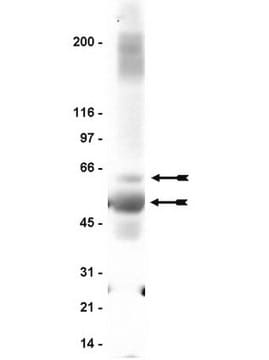MAB341
Anti-GABA A Receptor β 2,3 Chain Antibody, clone BD17
clone BD17, Chemicon®, from mouse
Synonym(s):
GABA(A) receptor subunit beta-2, gamma-aminobutyric acid (GABA) A receptor, beta 2, gamma-aminobutyric acid A receptor, beta 2
About This Item
Recommended Products
biological source
mouse
Quality Level
antibody form
purified immunoglobulin
antibody product type
primary antibodies
clone
BD17, monoclonal
species reactivity
mouse, feline, monkey, bovine
species reactivity (predicted by homology)
rat, human
manufacturer/tradename
Chemicon®
technique(s)
immunohistochemistry: suitable
immunoprecipitation (IP): suitable
western blot: suitable
isotype
IgG1
NCBI accession no.
UniProt accession no.
shipped in
dry ice
target post-translational modification
unmodified
Gene Information
human ... GABRB2(2561)
General description
Specificity
Immunogen
Application
A 10-20 μg/mL concetration of a previous lot was used in IH.
Immunoprecipitation:
A previous lot of this antibody was used in IP.
Western blot:
5-20 µg/mL. Recognizes a 55 kDa band corresponding to the beta chain of the GABAA receptor.
Optimal working dilutions must be determined by end user.
Quality
Western Blot:
1:500 dilution of this antibody detected GABA A Receptor β 2,3 Chain on 10 μg of mouse brain membrane lysates.
Target description
Linkage
Physical form
Other Notes
Legal Information
Not finding the right product?
Try our Product Selector Tool.
Certificates of Analysis (COA)
Search for Certificates of Analysis (COA) by entering the products Lot/Batch Number. Lot and Batch Numbers can be found on a product’s label following the words ‘Lot’ or ‘Batch’.
Already Own This Product?
Find documentation for the products that you have recently purchased in the Document Library.
Our team of scientists has experience in all areas of research including Life Science, Material Science, Chemical Synthesis, Chromatography, Analytical and many others.
Contact Technical Service





